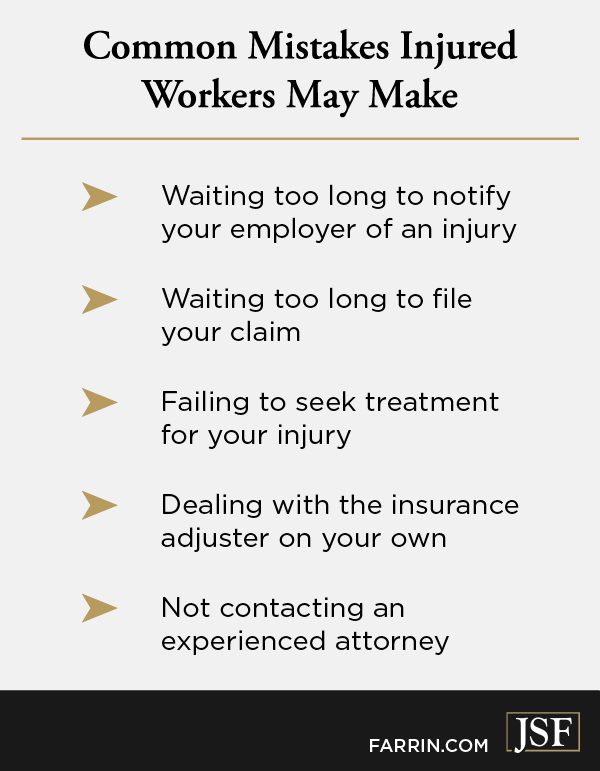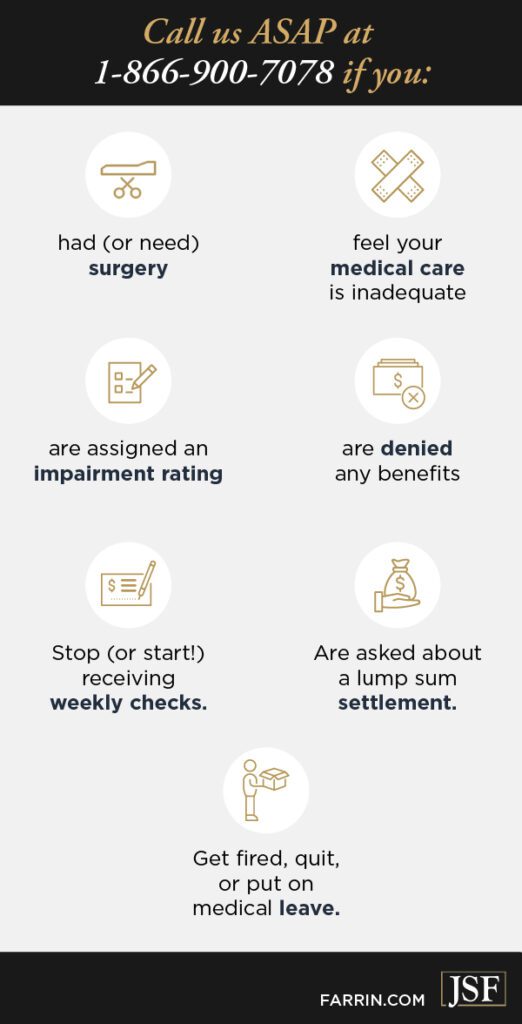
Are you eligible for workers’ compensation?
You may have many questions after your work injury: What if you were at fault? What if you were working remotely? What if…?
An experienced attorney can help you determine if you have a case.

This page refers to Do I Have a Workers Compensation Case law in North Carolina.
Since laws differ between states, if you are located in South Carolina, please click here.
Can I Claim Workers’ Comp in North Carolina? How Do I Know if I Have a Case?
If you’ve suffered a workplace injury or occupational disease, you may be wondering if you’re eligible for workers’ compensation. You may be eligible, but you must act quickly to preserve your rights — or you may get no benefits at all. Here’s what you need to know to determine if you’re eligible for workers’ compensation in North Carolina and what common mistakes you should avoid in the early stages.
There are three important rules for determining your workers’ comp eligibility:
That may seem fairly straightforward, but things get complicated quickly. What if the injury was your fault? What if you were at work but not actively working? What if someone intentionally injured you?
In fact, things can get so complicated with workers’ comp cases that the North Carolina State Bar certifies specialists in workers’ compensation law (several of our attorneys are NC State Bar Board-Certified Specialists in workers’ comp).
While you focus on your recovery, we can give you clarity on your case at no cost and no obligation. Call us at 1-866-900-7078 or contact us online. Someone is available to help you right now.
What Is Considered a Work-Related Injury?
In North Carolina, to be eligible for workers’ comp, your injury generally must happen “by accident” – that is, something out of the ordinary happened – during the course and scope of your work. The exceptions here are back injuries and hernias. The following are some common work-related injuries. It’s important to note that fault doesn’t matter for workers’ comp.
If you suffered one of these common work injuries in North Carolina, you are likely eligible for workers’ comp even if it was your fault:
Slips and Falls, such as slipping on a slick floor or tripping over something like a power cord.
Burns, including fire burns, chemical burns, and electrical burns, such as from an overheated laptop.
Back Injuries, such as throwing out your back while moving a patient to a new bed.
Head Injuries, such as a traumatic brain injury from a box falling on you from overhead.
You may also be eligible for workers’ comp due to repetitive stress injuries and occupational diseases. Some common examples of occupational diseases include:
Poisoning, including brass, arsenic, carbon monoxide, zinc, lead, and other compounds you might be exposed to.
Asbestosis or mesothelioma, due to exposure to asbestos.
Carpal tunnel syndrome, or other repetitive stress disorders from performing repetitive tasks.
Silicosis, from breathing in small particles in jobs like construction or mining.
Hearing loss or tinnitus, due to loud machinery, construction, engines, tools, and more.
This is by no means an exhaustive list of occupational diseases. If you believe your illness was caused by your job, contact a workers’ compensation attorney.
What If You’re Injured Doing Something Work-Related, But You’re Not at Work or Not Doing It During Work Hours?
When it comes to the law, each case is unique. Were you running an errand for your boss after hours? Or were you at an office party? Was the party mandatory? Did you fall in the parking lot on your way into the office before work? Does your employer own the parking lot?
If you were performing a work responsibility when injured or injured at an off-site work event, you may be eligible for full benefits and compensation.
But it’s very important to know that your employer’s insurance company is protecting their own interests, not yours. Your employer doesn’t want to pay higher insurance premiums, and most insurance companies make more by paying you less.
Whatever you hear or you’re told, don’t agree to anything before consulting with an experienced workers’ comp attorney.
Injuries That Are Not Covered by Workers’ Comp
Some circumstances that may bar you from compensation include:
- Intentionally injuring yourself
- If you were injured while under the influence of alcohol or drugs
- If you wait too long to file a claim
Tip: Notify your employer that you’ve been injured as soon as possible and within 30 days of the injury.
Workers’ Compensation and Fault
In North Carolina, the workers’ compensation system is a no-fault system. It doesn’t typically matter if the accident that caused your injury was your fault, a coworker’s fault, or even your boss’s fault. Negligence is not generally considered, and the system treats most cases the same.
Do you have a case? How do you know if the insurer is paying all your benefits? What if your employer demands you return to work immediately after your injury? Call 1-866-900-7078 today for a free professional opinion.
How Does Workers’ Compensation Work in North Carolina for Occupational Diseases?
Occupational diseases or illnesses are those caused by your working duties or environment. They can vary widely from repetitive stress conditions like carpal tunnel syndrome to diseases like asbestosis from prolonged exposure to toxic or hazardous substances on the job.
Inform your employer as soon as possible after being diagnosed with an occupational disease. You’re required to provide written notice to your employer within 30 days of being informed of your diagnosis and the work-related nature of your disease.
These cases can be much more difficult to prove than an immediate injury, but one of our workers’ comp attorneys can guide you, take on the insurance company for you, and significantly increase your odds of success.
I’m an Independent Contractor/Part-Time Worker. Am I Eligible for Workers’ Comp?
Workers’ compensation does not generally cover independent contractors. But are you certain that’s what you are?
Some employers or insurers may misclassify you and thereby avoid paying workers’ compensation benefits. If you disagree with your classification and think you should receive benefits, contact an experienced workers’ compensation attorney who will put you first.
Taking the insurance company’s word for your classification or eligibility may be a critical mistake.
What Are Some Common Mistakes Early on in a Workers’ Comp Case?
At the start of (and throughout) your workers’ comp process, there are some critical errors you want to avoid.
Is a Workers’ Comp Claim the Same as a Lawsuit?
No. Making a workers’ compensation claim is not a lawsuit, and you are not suing your employer. In fact, with very rare exceptions, you cannot sue your employer for a work-related injury even if you want to. The workers’ compensation system was put in place to keep courts from being overwhelmed with injured workers’ lawsuits.
Note that you may be able to sue someone else for your injury. You may be able to sue third parties, like the manufacturer of a defective product involved in your injury or a negligent driver who hit you while you were working. We can help you determine your best course of action, but don’t delay.
The longer you wait, the more you may be losing.
Contact a North Carolina Workers’ Compensation Attorney Today for a Free Case Evaluation
We can help you understand your rights under North Carolina workers’ compensation laws, navigate the system, and try to ensure that you receive all the compensation and benefits you may deserve.
Wherever you are in your workers’ compensation process, whether you were injured moments ago or your claim is nearing a resolution, we are ready to fight for you. And our results speak for themselves.1
We’ve been named to the 2024 Best Lawyers “Best Law Firms” list – our 9th year in a row – with a Tier 1 ranking for workers’ compensation.4
And there’s no need to worry about cost. There are no hourly fees and no upfront costs, and you pay no attorney’s fee at all if we don’t recover compensation for you. Guaranteed.2
For your free case evaluation, call 1-866-900-7078 or contact us online today.




